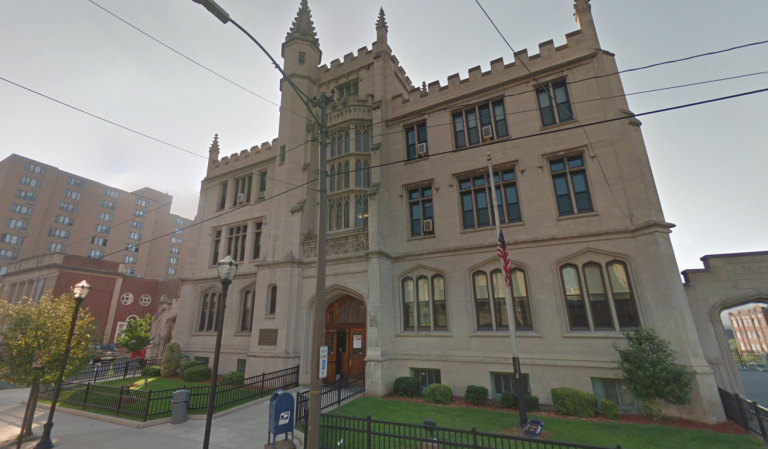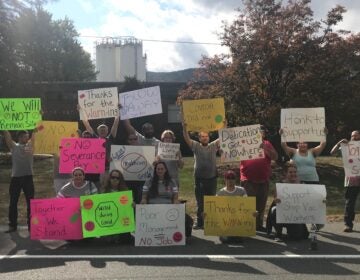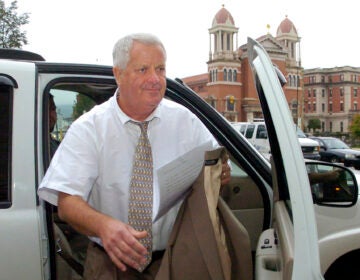Scranton school officials face felony charges for inaction on lead, asbestos
Starting in 2016, officials were repeatedly told about dangerous lead levels in drinking water in at least 10 schools, but failed to fix tainted fountains and sinks.

Scranton School District Administration Building (Google Maps)
The former superintendent of the Scranton School District and two other officials were charged with felonies Wednesday over allegations that they knew about lead and asbestos contamination in the schools but failed to properly act.
Pennsylvania Attorney General Josh Shapiro charged former Superintendent Alexis Kirijan, former Director of Operations Jeffrey Brazil, and current maintenance supervisor Joseph Slack with reckless endangerment and endangering the welfare of children.
Starting in 2016, officials were repeatedly told about dangerous lead levels in drinking water in at least 10 schools but failed to ensure tainted water fountains and sinks were fixed and misled the public about the problem, according to a grand jury.
Kirijan and Brazil also knew that inspectors had found dangerous levels of asbestos in dozens of locations, including classrooms, restrooms and a cafeteria, but did little about it, the grand jury said.
“This wasn’t just poor judgment,” Shapiro said at a news conference. “It was a criminal act that endangered others entrusted in their care.”
Shapiro described one instance where, when one principal emailed Kirijan about ceilings in his building’s classrooms caving in, sending dust into the air, Kirjian allegedly told the principal only to communicate via phone.

Get more Pennsylvania stories that matter
“The principal actually took the step of blocking Kirjian’s phone number so that the superintendent was forced to document the deteriorating conditions electronically on the school district’s email system,” Shapiro said.
All three defendants face charges that carry maximum sentences that could mean decades in prison.
Through a lawyer, Kirijan said she’d fight the charges.
“Kirijan has dedicated her career to educating children and we will defend her against these allegations,” said attorney Frank Nocito.
Lawyers for Brazil and Slack could not be reached.
Former Scranton SD Superintendent Alexis Kirijan silent as she enters her arraignment on felony charges over lead and asbestos in schools. Former Director of Operations Jeff Brazil and current Maintenance Supervisor Joseph Slack also had nothing to say. @FOX56WOLF pic.twitter.com/BiKTVqupBJ
— Viktoria Hallikäär (@ViktoriaKrista) September 30, 2020
The charges were met with sadness and support from Scranton’s school community.
Rosemary Boland, president of Scranton’s teachers union, said her members were deeply concerned about having been exposed to unsafe levels of lead and asbestos for years.
“I am certain the [defendants] involved will have a rough road ahead of them,” she said, “but we also don’t think we should have been the ones who were sacrificed.”
Current and former employees of the Scranton district are claiming in a separate federal lawsuit filed in February that officials knew for years that unsafe levels of lead and asbestos posed potential health risks for students and staff but never disclosed the information to them or the public. The district is seeking to have the suit dismissed.
The criminal case “obviously gives credence to our underlying civil case,” Patrick Howard, an attorney for the plaintiffs, told the Associated Press. “If the attorney general sees fit to file criminal charges, and the grand jury returned an indictment, then obviously the civil case should be a no-brainer.”
Scranton School Board President Katie Gilmartin said the board plans to cooperate with the Attorney General’s office.
“To think that these individuals knew what needed to be done and did no action is inexcusable,” she said.
This kind of case is highly unusual: a spokesperson for Shapiro’s office said they are not aware of any other instance across the country where law enforcement has filed criminal charges against school officials for alleged negligence of safety issues.
Mark DiRocco, president of the Pennsylvania Association of School Administrators, called the charges “concerning,” but wouldn’t comment further, saying he needed to read up on the case.
Dozens of other school districts and charters in Pennsylvania have been dealing with environmental hazards in school buildings for years. In Philadelphia, Benjamin Franklin High School was closed for months after dangerous levels of asbestos were found during a construction project.
In August, the district’s independent inspector general released the results of an investigation that found school leaders created dangerous conditions for students and staff at Franklin by pursuing an artificially compressed construction timeline.
Earlier this month, the Commonwealth Association of School Administrators, which represents city principals, circulated a petition expressing no-confidence in Superintendent William Hite, citing the IG report as a key factor.
On Wednesday, Philadelphia City Councilmember Helen Gym called the charges in Scranton a “wake-up call” for school officials and politicians to be more proactive in dealing with these issues.
“We don’t need to wait for things to rise to a criminal level,” Gym said. “There’s got to be action that’s taken. This can no longer be a back burner issue.
WHYY is your source for fact-based, in-depth journalism and information. As a nonprofit organization, we rely on financial support from readers like you. Please give today.






